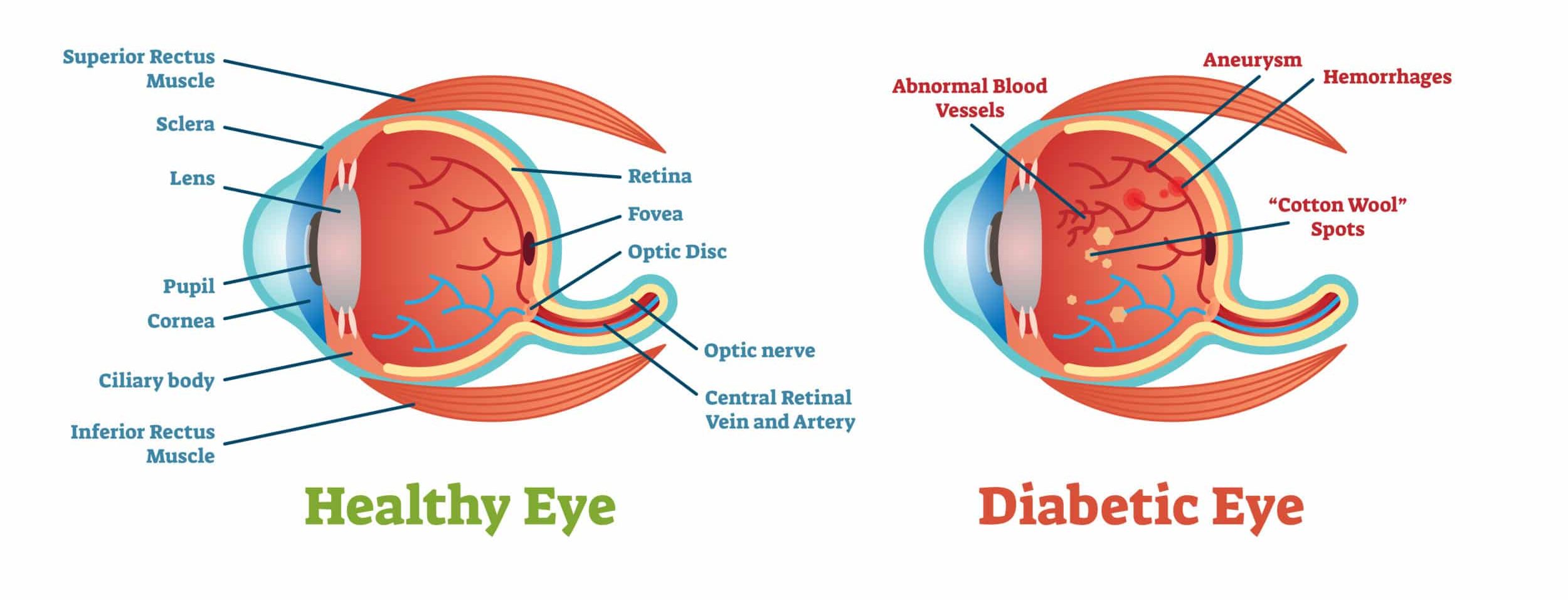
How Does Diabetes Have an Impact on Your Eyes?
Diabetes is a chronic condition that affects millions of people worldwide. While it primarily influences blood sugar levels, its impact extends to various parts of the body, including the eyes. Diabetes-related eye problems are a significant concern, and understanding how diabetes affects your eyes is crucial for maintaining good eye health. In this blog, we’ll explore the relationship between diabetes and eye health, the potential risks, and ways to protect your vision.
How Does Diabetes Impact the Eyes?
Elevated blood sugar levels resulting from diabetes can have both immediate and lasting effects on your vision:
Short term Effects: In the short term, high blood sugar can lead to blurry vision for various reasons. It may cause fluctuations in fluid levels within the eyes, leading to swelling. Sometimes, this short-term blurriness can resolve itself as blood sugar levels normalize. Conversely, if blood sugar levels drop too low, it can also cause temporary blurriness, a condition known as hypoglycemia.
Long-Term Effects: Uncontrolled diabetes can result in persistently high blood sugar levels, which can lead to gradual damage to the small blood vessels over time. These damaged blood vessels may leak fluid, causing swelling. Additionally, they can stimulate the growth of delicate new blood vessels that are prone to bleeding into the central part of the eye. This can result in scarring or a dangerous increase in eye pressure. These issues can, in turn, lead to further complications involving the retina, ultimately causing persistent blurry vision and even vision loss.
Eye Diseases Caused by Diabetes
The four most serious diabetic eye diseases include:
Diabetic Retinopathy
Diabetic retinopathy is one of the most common and serious eye complications associated with diabetes. It occurs when high blood sugar levels damage the tiny blood vessels in the retina, the light-sensitive tissue at the back of the eye. In the early stages, diabetic retinopathy may not cause noticeable symptoms, but as it progresses, it can lead to vision loss and even blindness.
Diabetic Macular Edema (DME)
DME is a specific type of diabetic retinopathy that affects the macula, the central part of the retina responsible for sharp, central vision. When the macula swells due to leaking blood vessels, it can lead to blurred or distorted vision. DME can be a severe complication, significantly impacting your ability to read, drive, or recognize faces.
Cataracts
People with diabetes are more likely to develop cataracts at a younger age than those without the condition. Cataracts are characterized by clouding of the eye’s natural lens, leading to blurry vision, glare, and reduced contrast sensitivity. While cataracts can be treated surgically, diabetes can complicate the procedure and increase the risk of complications.
Glaucoma
Diabetes increases the risk of developing glaucoma, a group of eye conditions that damage the optic nerve, leading to vision loss. Glaucoma often develops silently, with no noticeable symptoms until significant damage has occurred. Regular eye exams are essential for early detection and management.
Preventing Diabetes-Related Eye Complications
While diabetes can have a significant impact on your eyes, there are steps you can take to reduce the risk of complications:
- Maintain Proper Blood Sugar Control: Keeping your blood sugar levels within the target range recommended by your healthcare provider is crucial in preventing diabetic eye problems.
- Regular Eye Exams: Schedule comprehensive eye exams with an eye specialist, such as Best Ophthalmologist in Hyderabad, at least once a year. Early detection and treatment can prevent or minimize vision loss.
- Manage Blood Pressure and Cholesterol: Controlling high blood pressure and managing cholesterol levels can help reduce the risk of eye complications.
- Quit Smoking: If you smoke, quitting can reduce your risk of eye diseases, including diabetic retinopathy.
- Healthy Lifestyle Choices: A balanced diet, regular exercise, and maintaining a healthy weight can help manage diabetes and its effects on your eyes.
Conclusion
Diabetes can have a profound impact on your eyes, potentially leading to serious complications such as diabetic retinopathy, cataracts, and glaucoma. However, with proper diabetes management, regular eye examinations, and a healthy lifestyle, you can reduce the risk of these complications and protect your vision. Remember that early detection and intervention are key to preserving your eye health while living with diabetes.
If you experience any eye-related symptoms or vision issues, Contact our Best Eye Care Hospital in Hyderabad. Abhinav Eye Hospital is a specialized Best eye hospital in Telangana, dedicated to offering exceptional services to people from all walks of life. To arrange a consultation, please get in touch with our medical team without delay.






